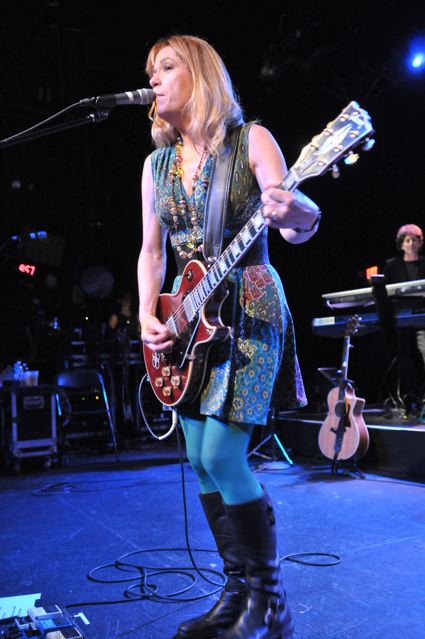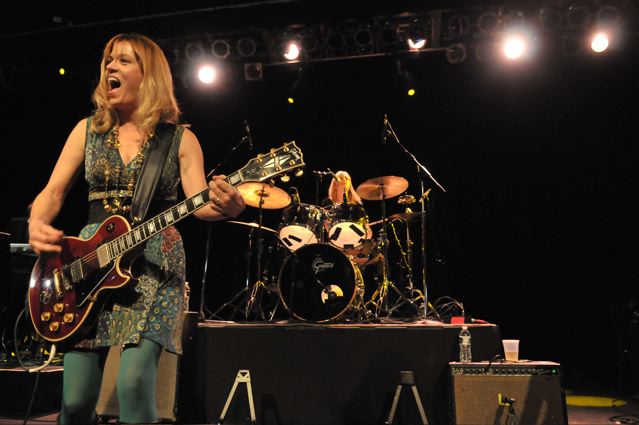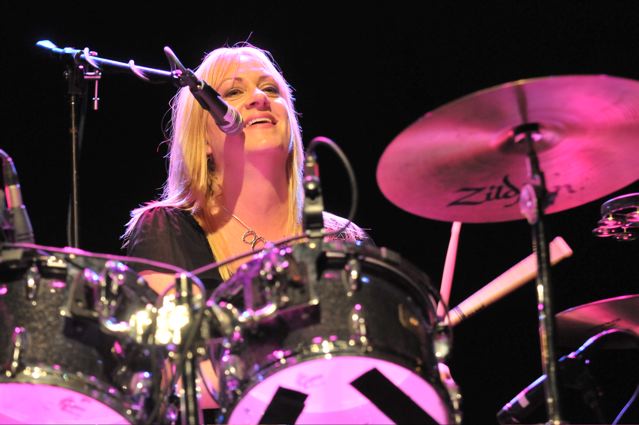It’s hard to
believe, but the Bangles have now been reunited for even longer than
their original glory days. Even harder to believe is the fact that
their latest CD, Sweetheart of the Sun, is as good as any of
their albums.
This is coming from
a band which has put together several terrific albums over the
years. From their original 1983 self-titled EP through their
critically acclaimed debut All Over the Place to their 80s
smash hit Different Light, The Bangles have always deservedly
gotten terrific press. During a mid-late 80s heyday which spawned
the hits “Manic Monday,” “If She Knew What She Wants,” “Walk Like an
Egyptian,” “Hazy Shade of Winter,” “In Your Room” and “Eternal
Flame,” they were one of those rare bands that got reviews
commiserate with their sales. The band’s strong power-pop chops
kicked ass and named names.
After a long-time breakup that lasted most of the
1990s, The Bangles finally returned to the studio and concert stage
at the turn of the millennium. Most of the band members were
married and had families, though, so it is more difficult to find
the time to record. Their 2003 comeback CD Doll Revolution
showed that the band still had the musical goods, though.
Since the release
of Doll Revolution, bassist Michael Steele – who played on
all the previous full-length albums for the band, but was not on the
original EP – has decided to retire. Therefore, the group is back
to being a lean and mean trio of guitarists Susanna Hoffs and Vicki
Peterson and drummer Debbi Peterson.
Sweetheart of
the Sun was produced and performed on by
fellow pop lover Matthew Sweet (Girlfriend) – who has had a
nice little side project covering 60s and 70s hits with Bangles lead
singer Susanna Hoffs.
The band and Sweet
have given the music a lo-fi jangly swing that is reminiscent of
early influences like The Byrds, Todd Rundgren and power pop faves
of the 60s and 70s. The new songs are strong, from the wonderfully
catchy opener “Anna Lee (Sweetheart of the Sun)” to the barreling
rocker “Ball and Chain.” Other standout tunes include the layered
single “I’ll Never Be Through With You” and the lively “What a
Life.”
As the Bangles
got ready to release the new CD and hit the road for their first
long-term tour in years, we sat down with drummer Debbi Peterson to
talk a bit about the band.
 In the early 80s
when you and your sister started a band, could you have ever
imagined that you would still be at it over 30 years later?
In the early 80s
when you and your sister started a band, could you have ever
imagined that you would still be at it over 30 years later?
Oh, God, no!
(laughs) But, you know what; I always knew we would do
something, though. I always had this crazy tunnel vision, like I
know we’re going to be on the radio. We’re going to be on AM radio,
because at the time, we wanted to be on AM radio. (laughs again)
So, yeah, I don’t think it was completely [expected]… If somebody
had said it, I would have laughed in their face – like, yeah, right,
sure. But it was probably a possibility in my head at the time.
The original
Fawlty EP and
All Over the
Place
were both
critically acclaimed, but kind of flew under the radar of popular
music. At that point, did you feel that you may always be something
of a cult band?
Well, it did
pretty well in college radio. So that was kind of fun, because we
were going out on tour, all of us in one van and sharing hotel
rooms. It was very much like a glee club type of thing.
(laughs) We’re all together and we were all young and it was
all fresh. It was one of those things like; well at least it’s on
college radio. That’s cool. College kids are cool. So, we started
a following, started building up the foundation. But of course we
hoped it would go further than that. People always do. So, you
just need to keep plugging away and working at it.
One different
thing about the Bangles as a group is that you have three lead
singers and songwriters – and until recently had four. How do you
feel that this variety helps the band, and in some ways does it make
it a little harder for you as a member?
Yeah, it does.
It’s always a challenge trying to please everyone and make sure
everybody got a chance to be heard. That was always difficult,
especially having outside influences like record companies and
management, who naturally just tend to pick one or two people that
they focus on. That was a challenge, trying to make sure everybody
got a chance. It didn’t always work that way. But the good thing
about it is you have a full album of a lot of different influences,
different voices. It certainly makes for a different album. You’re
not just hearing the same person over and over. Like, oh that song
kind of sounded like the last song… You know you’re going to have
different songs, because they come from a very different four
writers.
 Over the years
I’ve spoken with both your sister and Susanna about this, but I’d
love to hear you take on what it was like in 1986 when everything
just kind of exploded for the band. How surreal was it to suddenly
be all over the radio and TV after struggling to get there for
years?
Over the years
I’ve spoken with both your sister and Susanna about this, but I’d
love to hear you take on what it was like in 1986 when everything
just kind of exploded for the band. How surreal was it to suddenly
be all over the radio and TV after struggling to get there for
years?
Well, the thing
is, it wasn’t like we were instantly everywhere. It definitely
built up and got to that point. So it wasn’t necessarily a big
shock or anything. We were just working and working and plugging
away. And touring – we did a lot of touring. We were on the road a
lot. Basically, we’d make an album and we’d be on the road for the
rest of the year. We were very, very busy when all that started
really happening and picking up. It was really cool. I remember
one time that we were all going for a walk in Washington, D.C.,
because we used to try to work out and go for walks every day when
we were on the road – keep in shape. We were all walking around the
Capitol Building and all the different places. Somebody drives up
and stops at a stop sign in a convertible. All of the sudden, we
all look at each other like, “I know this song. What is this
song?” And it’s “Manic Monday.” That was the first time we’d
actually heard it from somewhere other than our possessions.
(laughs) It was very exciting! We were jumping up and down in
the middle of the street. That was a real highlight moment. We had
a few of those. We’d turn on MTV and see your video on. Like,
wow, we made it onto MTV! It was a very big deal.
In your previous
albums you had done a lot of covers, but as a band member and a
songwriter how important was it to you that by the
Everything album, you all had enough clout to record only
songs written or co-written by band members? And the last two
albums you had one cover apiece, I believe.
Well, we always
had done covers, anyway. In the very early days in our live stuff,
we did “Hazy Shade of Winter” very early on on the Sunset Strip.
We’ve done a song called “How Is the Air Up There?” which was on the
EP. That’s something we still do. We’ve still got two covers on
the new record.
Okay, I knew the
Nazz song [“Open My Eyes”] was a cover….
Yeah, the Nazz
song and “Sweet and Tender Romance.” That was a cover as well. So,
that’s something we’ve always liked to do, because we like taking
other people’s songs and just making them our own. But we also
write, as well. The new record has a lot of band songwriting.
We’ve got songs with three of us writing, or two of us writing.
We’ve got songs writing with other people. There’s a real good
plethora, combination melting pot of songwriting on this record.
But we’ve still got our covers, because we still like to do that.
 It’s kind of well
documented that towards the end of the Bangles run there were a lot
of hard feelings about everyone wasn’t getting credit in the band.
Why do you feel you needed to take some time away and was it
difficult to just walk away from a group you had worked so hard with
when it had finally reached the top?
It’s kind of well
documented that towards the end of the Bangles run there were a lot
of hard feelings about everyone wasn’t getting credit in the band.
Why do you feel you needed to take some time away and was it
difficult to just walk away from a group you had worked so hard with
when it had finally reached the top?
Well, the whole
break-up of the band, it was difficult. It was very sad, because we
were like family. It was like people’s marriage and it was breaking
up. We were living on top of each other. We were on the road all
the time. Basically, everything we did was Bangles related. We had
no other life. We got to a point where we were exhausted. We just
had enough of each other. We needed a break, like anybody does.
You need a break every once in a while. And some people were not
feeling fulfilled, musically. I often wanted to go off elsewhere
and work with other people. Unfortunately, the actual break-up was
kind of a bad scene, because a couple of us were told, “Well, we’re
breaking up the band.” You can go off and do other things. It was
very uncomfortable. It was very sad. But, it’s like, okay, fine,
now is the chance to go do other things and explore our lives.
I was at your
first reunion show at the House of Blues in LA. I know at that
point you had also done the song for the
Austin Powers soundtrack as well. From what Vicki told me, you and
Susanna were the ones who wanted the reunion first, she and Micki
were the holdouts. How did the reunion come about and what was it
like to play together again?
(laughs)
Actually Susanna was the one… oddly enough, she wanted to leave when
we broke up, really, and then she was the one who kept calling all
of us at different times going, “Why don’t we do this again? Let’s
get back. I really miss that connection. I really miss the fun
that we used to have together. I really miss singing with you guys
and playing.” So, she was the one kind of pushing it a little. At
first, I was like, no, I’m not interested, I’m doing something
else. Then she had her first child and I was pregnant with my first
child and suddenly we started talking like moms, you know? “What’s
it like, being a parent?” I was getting some parental advice from
her and then we started writing together. That’s how that all
started off. Vicki was still pretty adamant about not doing it.
She had the Continental Drifters going on. She was still doing her
other thing. I’m like, fine, but I just started writing songs with
Sue. Then, Vicki just thought, well, why not? Let’s just do it. I
don’t know if we can do “Walk Like an Egyptian” again. (laughs)
But she said let’s give it a whirl. Let’s try it. Then we wrote
the song for the Austin Powers movie and we got Michael
finally to come and play with us in the studio. That was fun,
because that was like putting a pair of old comfortable shoes on.
We all started laughing and joking. All the old jokes came out. It
was fun.
 Sweetheart of
the Sun
is the first album you have done since the original EP without
Michael. Was it weird recording the album without her? How did it
change the work dynamic?
Sweetheart of
the Sun
is the first album you have done since the original EP without
Michael. Was it weird recording the album without her? How did it
change the work dynamic?
Well, Michael had
already decided in like 2004 or 2005 that she just wanted to
retire. She didn’t want to do it anymore. So we had a few years
there where we played with different bass players. So, it was like,
well, we’re back to the original Bangles. This is us. This is the
core of the group. One day, we finally just woke up. Dealing with
kids and stuff, you’re constantly busy; you’ve always got something
going on. We finally woke up and said, “Hey, let’s make an album.”
We had all these songs. We had some songs from like 1993, some
songs from 2001, or 1999. We all just got together and said, “What
about this song? What about that song?” There were a couple of
songs that were going to be on Doll Revolution and ended up
not being on that because we did all these other songs. So we put
them on this one. Oddly, enough, it seems to work great with the
other songs.
One thing I like
about
Sweetheart of
the Sun is that it goes back to the low-frills feel of the
first album. Were you all trying to give the album a more rootsy,
triple-A feel?
I don’t think
we were conscious about doing that. I think it was just we wanted
to go back to early Bangles. Back to basic Bangles. Kind of going
full circle, really. I don’t know how conscious that was. It was
more like, this feels good. This feels right. This song works with
this song. When we were recording – we recorded in 2007 and 2009,
just doing the basic tracks, and that was just me and the guitars,
we didn’t have our bass player with us at the time – that was
interesting. It was just a very interesting way to make a record.
We didn’t know how it was all going to turn out until right before
we started mixing it and finished all the background vocals. Then
we realized there really was a theme going on here.
 Matthew Sweet has
such a brilliant pop mind. Obviously, Susanna has a long working
relationship with him, but what was he like to work with in the
band?
Matthew Sweet has
such a brilliant pop mind. Obviously, Susanna has a long working
relationship with him, but what was he like to work with in the
band?
All of us, we’ve
done a couple of other projects with him. I had written a couple of
songs with Susanna and Michael that haven’t made it anywhere yet,
but just as a songwriting experiment with Matthew. He’s great.
He’s a great writer. He’s a great guy. Very sweet. A real
artist. He’s an amazing person and it was very fun to work with
him.
The music
business has changed so much since your hey-day, with the labels
floundering, much more indie music, internet, downloading, piracy,
radio playlists becoming more & more set in stone. As a musician,
how hard is it to get your work out to an audience these days? At
this point, do you even think of getting hits?
Well, it’s a
whole different world out there than when we started. All
different. It’s still kind of a learning process for us. As I’m
sure it is for the record companies. They’re trying to figure out
what they are doing – the whole download thing, the internet thing.
The good thing about the internet thing is that a lot of
up-and-coming bands, young bands can make a video for nothing and
put it on YouTube. That is good, because it gets you out there. A
lot of people watch YouTube. That’s the good thing. The drag is
the whole downloading thing. People doing it without artists
getting paid. That’s not very cool. We’re all still trying to
figure it out, how to make it work, trying to go with the flow.
Sweetheart of
the Sun
is the first album you have released completely independently (Doll
Revolution was distributed through Koch) since the original
EP. How is recording for yourself different than recording for a
major label?
It’s our record
company. Same thing with Doll Revolution, it is on Down
Kiddie! Records, which we did our first single, the very first song,
on….
 Right, “Getting
Out of Hand.”
Right, “Getting
Out of Hand.”
“Getting Out of
Hand,” that’s right. So this one is on Down Kiddie! Records, but
it’s also on Model Music, which is our distribution company.
They’ve got Universal behind them, too. It’s good to have that
distribution help, because that’s something that we could never all
three of us sit down and try to do that. (laughs) It would
just never happen. We’re just juggling too many things. So, yeah,
we do have some help, it’s not completely independent. Then again,
neither was the EP, that was Fawlty Products. So, it’s always good
to have some help.
Looking back on
your career, how would you like for people to see your music?
Well, I’d like to
see the band being known as something other than just walking like
Egyptians. (laughs) Because, there’s so much more to the
Bangles than “Eternal Flame” and “Walk Like an Egyptian” and “Manic
Monday.”
It’s funny, I
interviewed Marti Jones [who recorded the original demo of “Walk
Like an Egyptian”] many years ago, and she said she was happy to
record the song for Liam Sternberg because she really liked him, but
she thought it would be a weird thing to be known for.
(laughs)
It is. It’s weird. I mean, the kids get a kick out of it, but it’s
weird. I would like the Bangles to be known for more than that. As
good songwriters, our amazing harmonies and just as a band that has
a lot more vast amount of songwriting and music to share.
Hopefully, this album will get heard and people will like it. To
me, this album is more how the Bangles really are.
Are there any
misconceptions out there you’d like to clear up?
Well, there’s
still the old misconception that we don’t play our own music. We
don’t play our own instruments. Some people out there still think
we just sing and don’t ever play, and that is sooo wrong. We
do!
CLICK HERE TO SEE WHAT VICKI PETERSON OF THE BANGLES HAD TO SAY TO
US IN 2003!
CLICK HERE TO SEE WHAT SUSANNA HOFFS OF THE BANGLES HAD TO SAY TO US
IN 2012!